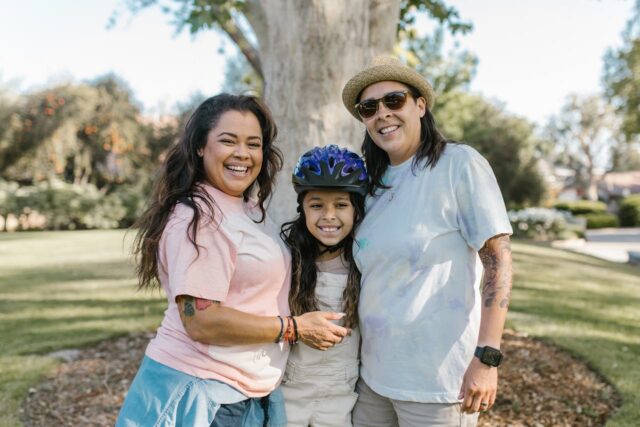Navigating a relationship with your adult children requires a bit of finesse.

While you’ll always be their parent, it’s important to establish healthy boundaries as they grow into independent adults. You’re not creating distance or withholding love; you’re encouraging mutual respect and maintaining a healthy relationship.
1. Respect their privacy and independence.

It’s tempting to want to know every detail of your adult child’s life, but it’s important to respect their privacy. Avoid prying into their personal affairs, snooping through their belongings, or demanding constant updates. Instead, let them share what they feel comfortable with and trust that they’re capable of making their own decisions.
2. Avoid unsolicited advice or criticism.

While you might have years of wisdom and experience to offer, resist the urge to give unsolicited advice or criticism. Unless your child specifically asks for your opinion, it’s best to keep your thoughts to yourself. Unsolicited advice can come across as judgmental and undermine their confidence in their own choices.
3. Respect their choices, even if you disagree.

Your adult child may make choices that you don’t agree with, whether it’s their career path, partner, or lifestyle. As long as their choices aren’t harmful to themselves or anyone else, it’s important to respect their decisions. Remember, they’re individuals with their own values and aspirations, and it’s not your place to dictate their lives.
4. Don’t expect them to always be available to you.

While you might want to spend every waking moment with your child, it’s important to recognise that they have their own lives, responsibilities, and relationships. Don’t expect them to always be available to you, especially if you haven’t made prior arrangements. Give them the space to live their own lives and cherish the moments you do get to spend together.
5. Don’t offer financial support unless it’s absolutely necessary.

It’s natural to want to help your adult children financially, but it’s important to set boundaries around financial support. If you’re constantly bailing them out of financial trouble, it can enable irresponsible behaviour and create unhealthy dependency. Instead, encourage them to develop financial independence and only offer assistance in truly dire situations.
6. Avoid taking sides in conflicts between your adult child and their partner.

Relationships can be complicated, and it’s not uncommon for adult children to have disagreements with their partners. However, it’s important to remain neutral and avoid taking sides. If you get involved, you risk alienating one or both parties and damaging your own relationship with your child. Instead, offer a listening ear and support without judgment.
7. Respect their parenting choices, even if you disagree.
 Source: Unsplash
Source: Unsplash If your adult child has children of their own, it’s important to respect their parenting choices, even if they differ from your own. Remember, they’re the parents now, and it’s not your place to criticise or undermine their decisions. Instead, offer support and encouragement, and trust that they’re doing what they believe is best for their children.
8. Don’t use guilt or manipulation to get what you want.

Guilt-tripping or manipulating your adult child is never a healthy way to interact. Phrases like “After everything I’ve done for you…” or “You should be ashamed of yourself…” can damage your relationship and create resentment. Instead, communicate your needs and expectations clearly and respectfully.
9. Set clear boundaries around communication.
 Source: Unsplash
Source: Unsplash Establish expectations for how and when you’ll communicate with each other. This could involve agreeing on a specific time each week to chat, setting limits on texting or calling, or respecting each other’s need for space and quiet time. Clear communication boundaries can prevent misunderstandings and resentment.
10. Don’t expect them to share your values or beliefs.

As your child grows older, they may develop their own set of values and beliefs that differ from your own. It’s important to respect their individuality and avoid trying to impose your views on them. Instead, focus on finding common ground and building a relationship based on mutual respect and understanding.
11. Avoid giving unsolicited parenting advice.

If your adult child has children of their own, it’s tempting to offer parenting advice based on your own experiences. However, unsolicited advice can often be unwelcome and may even strain your relationship. Unless your child specifically asks for your opinion, it’s best to keep your advice to yourself and trust that they’re capable of making their own parenting decisions.
12. Set clear boundaries around visits and overnight stays.

If you live separately from your adult child, establish clear expectations around visits and overnight stays. This might involve agreeing on a regular schedule for visits, setting limits on the length of stays, or respecting each other’s need for personal space and privacy. Clear boundaries can help prevent misunderstandings and ensure that everyone feels comfortable and respected.
13. Don’t compare your adult child to their siblings or other people.
 Source: Unsplash
Source: Unsplash Comparisons can be hurtful and damaging to self-esteem. Avoid comparing your adult child to their siblings, cousins, or other people. Each person is unique and has their own strengths and weaknesses. Celebrate your child’s individuality and focus on their personal growth and achievements.
14. Avoid giving them the silent treatment.

The silent treatment is a passive-aggressive tactic that can be incredibly hurtful. If you’re upset with your adult child, it’s important to communicate your feelings openly and honestly. Avoiding them or giving them the silent treatment will only create distance and resentment.
15. Encourage them to develop their own support system.

As your child matures, it’s important for them to develop their own support system of friends, mentors, and professionals. Encourage them to build relationships outside of the family unit and to ask for help from other people when needed. This will promote their independence and resilience.
16. Remember that you’re their parent, not their friend.

While it’s great to have a close relationship with your adult child, it’s important to remember that you’re still their parent. This means setting boundaries, providing guidance when needed, and holding them accountable for their actions. Avoid trying to be their best friend or peer, as this can blur the lines of authority and make it difficult to maintain healthy boundaries.




